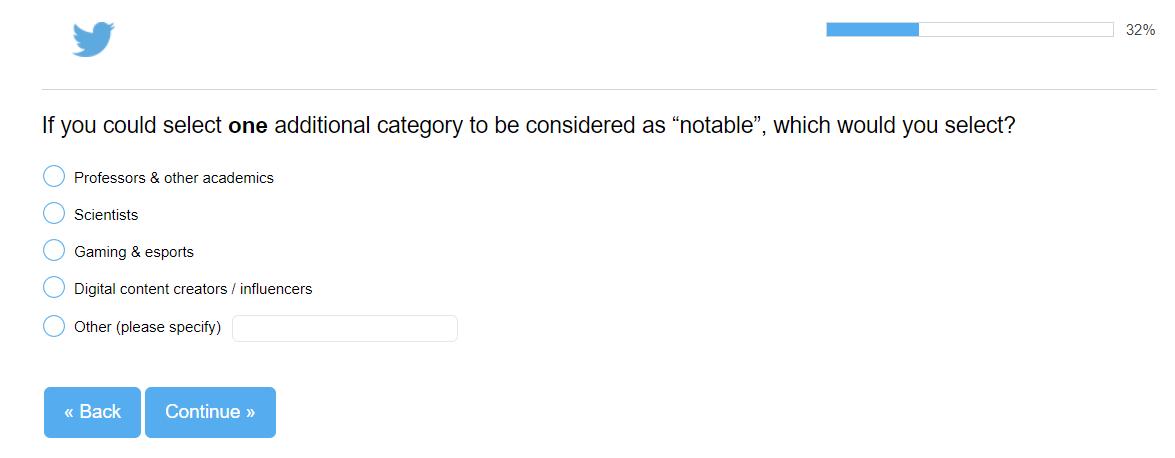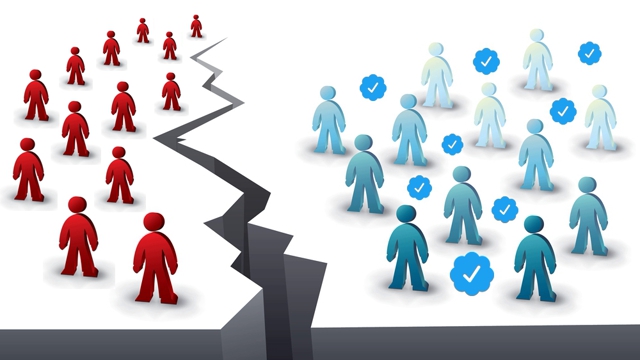Twitter is taking a “new approach to verification,” updating criteria for granting new blue check marks, along with a foundation to strip some existing blue badge accounts of their verified status.
“Some accounts might lose verification to ensure the process is more equitable” — Twitter
As part of the verification process reboot, Twitter is currently asking for user feedback on its approach via an online survey, which will expire on December 8, according to the big tech company’s blog post from November 24.
In one of the survey questions, Twitter asks its users if they would consider academics, scientists, digital content creators, or gamers as being “notable,” and the social media giant expressed its intent “to expand the categories and criteria for verification significantly over the next year.”

Twitter Verification Process Survey (Screen Shot)
“We intend to expand the categories and criteria for verification significantly over the next year” — Twitter
Twitter accounts are verified when the user is both “active” and “notable,” according to the big tech company’s “About Verified Accounts” draft policy.
Currently, there are six categories in the draft policy that determine whether an account is “notable.” These include:
- Government: Accounts of key government officials and offices, including heads of state, elected officials, appointed ministers, institutional entities, ambassadors, and official spokespeople.
- Companies, brands, and organizations: Accounts representing prominent organizations, and secondary affiliated accounts, including companies, brands, non-profit organizations, as well as their leaders and other prominent executives.
- News: Any official accounts of qualifying news organizations, as well individual accounts of journalists employed by qualifying organizations may be verified, if the account is public (does not have protected Tweets) and refers directly to the name and official URL of the qualifying organization and otherwise meets the criteria laid out in this policy.
- Entertainment: Accounts of major entertainment companies, such as film studios, TV networks, and music entities may be verified.
- Sports: Accounts of professional sports leagues, teams, rostered athletes, and coaches listed on the official team website or in sports data services such as Sportradar may be verified, as may those of athletes participating in global competitions such as the Olympics and Paralympics.
- Activists, organizers, and other influential individuals: Outside the professional categories defined above, people who are using Twitter effectively to bring awareness, share information, and galvanize community members around a cause, to bring about socioeconomic, political, or cultural change, or to otherwise foster community, may be verified.
“We recognize that there are many verified accounts on Twitter who should not be” — Twitter
Now, Twitter is asking users in its survey if they would consider adding one of the following to the “notable” criteria:
- Professors & Other Academics
- Scientists
- Gaming and Esports
- Digital Content Creators / Influencers
- Other (Write-in)
“Twitter may remove the blue verified badge and verified status of a Twitter account at any time and without notice” — Twitter
Twitter plans to introduce the new verification policy in the coming weeks, and it will look to start adding and removing blue badge verifications in accordance with the new policy beginning next year.
According to Twitter, “This policy will lay the foundation for future improvements by defining what verification means, who is eligible for verification and why some accounts might lose verification to ensure the process is more equitable.”
While Twitter didn’t mention any specific accounts that would lose their blue badge verification, the social media company’s current draft policy says that accounts are stripped of their verification if they:
- Are inactive, incomplete, or no longer hold the position for which they were initially verified
- Impersonate or intentionally mislead people on Twitter by changing their display name or bio
- Repeatedly violate Twitter policies on:
“We recognize that there are many verified accounts on Twitter who should not be,” reads the Twitter blog.
“We plan to start by automatically removing badges from accounts that are inactive or have incomplete profiles to help streamline our work and to expand this to include additional types of accounts over the course of 2021.”
“We’re sharing the start of our plans to revamp how people can identify themselves on Twitter” — Twitter
Next year, Twitter will also look to create different ways for people to identity themselves beyond blue badges, including “account types and labels.”
Will Twitter’s new verification policy create more diversity of thought, or will it further the polarizing echo chambers inherent in the ecosystem?
On the one hand, blue badge verification can be very helpful to users who want to quickly verify if an expert is who they say they are, so users can feel more confident about the sources they share.
But on the other hand, Twitter is a private company, has its own business interests, and is immune from the legal consequences of censoring free speech.
“This policy will lay the foundation for future improvements by defining what verification means”
Could Twitter’s policy changes contribute to a hierarchical class structure where select blue badges, account types, and labels are boosted while those who aren’t granted such honorifics are censored or suppressed?
Twitter’s new verification process has the potential to help bring about more well-rounded online discourse by identifying, labeling, and cross-linking to credible sources that have opposing views.
At the same time, the social media giant could potentially use the verification policy to categorically put labels on people that would determine whether their opinion is ranked as important or not.
Twitter will be announcing the final policy on December 17, 2020.
Your digital identity can be used against you in the event of a great reset
Tech products, culture are ‘designed intentionally for mass deception’: Ex-google ethicist testifies











